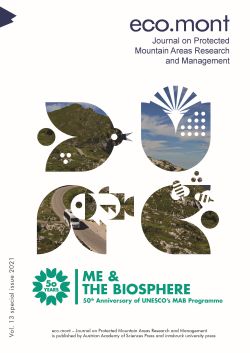
Eco.mont Vol. 13 special issue 2021, pp. 38-48, 2021/11/23
Journal on Protected Mountain Areas Research and Management

Arganeraie Biosphere Reserve (ABR) in Morocco was established in 1998. Today the reserve covers 2.5 million hectares and more than 3 million people and, as such, it has been a complex social-ecological system to govern. Authors draw on postnormal conservation science and environmental governance studies to investigate environmental governance processes within the ABR and shed light on their outcomes and challenges to date. First, authors analyse how Moroccan institutions are managing this vast territory. Second, we look at perceptions of an extended peer community of decision-makers. This research adds an empirical case study to the North African region and addresses two main weaknesses of UNESCO Biosphere Reserves worldwide: 1) effective governance and 2) shortcomings in their implementation. Through an ethnographic approach, we are able to point out how low strategic priority and a weak political will regarding the ABR may be hindering inclusive environmental governance. The authors suggest some key aspects for improving the existing governance system; various baseline needs and barriers that may be addressed in advance; a set of drivers, and several proposals for inclusive governance in the ABR. This study should prompt academia, policy- and decision-makers to identify and enhance synergies that allow for a shared vision of their territory.
Keywords: argan, social-ecological systems, natural protected areas, post-normal science, ethnography, stakeholder analysis, social learning